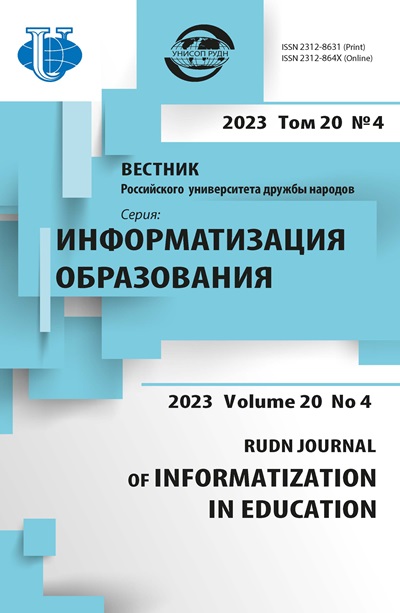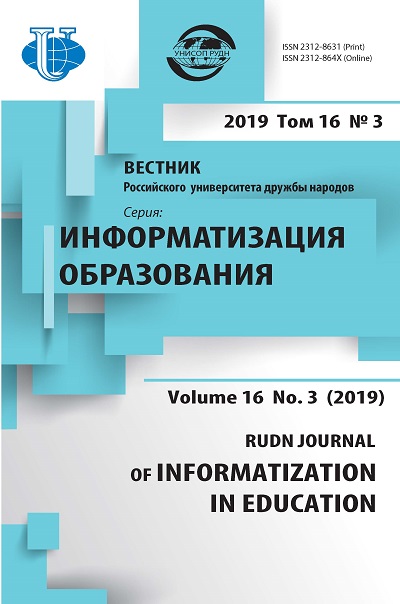Digital identity, digital self-identification, digital profile: problem statement
- Authors: Kondakov A.M1, Kostyleva A.A1
-
Affiliations:
- Moscow State Pedagogical University
- Issue: Vol 16, No 3 (2019)
- Pages: 207-218
- Section: DIDUCTIC ASPECTS OF EDUCATION INFORMATIZATION
- URL: https://journals.rudn.ru/informatization-education/article/view/22165
- DOI: https://doi.org/10.22363/2312-8631-2019-16-3-207-218
Cite item
Full Text
Abstract
Problem and goal. Article is devoted to a research of the problematic issues concerning digital identity, digital self-identification of the personality, a digital profile. Not only scientists of the humanitarian direction, but also experts in the field of public administration, finance, edu- cation, philosophy and ethics, hi-tech sectors of economy are engaged in search of answers to these questions, because formation of digital identity is a sphere of personal, public, corporate and national security. The purpose of the research described in article is definition on the basis of the analysis of the developed approaches to digitalization of society of possible problems in the field of formation of digital identity of the personality and identification of the main solutions of such problems. Methodology. The analytical research on identification of the questions characterizing the processes of digitalization of society is conducted. The first block of questions: what is digital identity? What its features? How the digital identity in the conditions of network communication is formed? The second block of questions: how there is a digital self-identification of the personality? What consequences of this process for real and virtual (convergent) life of the individual? The third block of questions: what is a digital profile? Who provider of a digital profile? What do new opportunities and risks of use of digital profiles consist in? Results. During the research it is reasoned that in the conditions of the digital economy assuming universal use of big data arrays, the solution of the problem of control over formation of digital identity of the citizen is of particular importance. Since the earliest age, at the person it is necessary to develop skills of formation of digital identity purposefully. The only way to restore complete control over a digital projection of the person is to make all data on the user open for him. Experience of application of the corresponding digital profiles generates the new risks listed in article. Conclusion. Problems of digital identity, digital identification and a digital profile are subjects for serious public and professional and scientific discussion. The digital identity has more and more increasing impact on human life and society. Formation of digital identity is a question of personal, public and national security. The person needs to learn to form the digital identity.
About the authors
Alexander M Kondakov
Moscow State Pedagogical University
Author for correspondence.
Email: alex.m.kondakov@gmail.com
corresponding member of Russian Academy of Education, doctor of pedagogical sciences, full professor, scientific director of the Institute of Digital Education Development of Moscow Pedagogical State University
64 Usacheva St., Moscow, 119048, Russian FederationAnna A Kostyleva
Moscow State Pedagogical University
Email: kostyleva_anechka@mail.ru
candidate of psychological sciences, director of the center of pedagogical network interaction of the Institute of Digital Education Development of the Moscow Pedagogical State University
64 Usacheva St., Moscow, 119048, Russian FederationReferences
- Appelhans A.V., Pyatakova O.I. Chto takoye tsifrovaya identichnost [What is a digital identity]. Sotsialno-ekonomicheskiye i pravovyye sistemy stran evraziyskoy ekonomicheskoy integratsii: materialy Mezhdunarodnoy nauchno-prakticheskoy konferentsii [Socio-economic and legal systems of the Eurasian economic integration countries: materials of the International scientific and practical conference]. Omsk: Sibirskiy institut biznesa i informatsionnykh tekhnologiy. 2019. Pp. 463–466.
- Arpentyeva M.R. Mediatizatsiya zhizni i tsifrovoye kochevnichestvo: tipy tsifrovogo kochevnichestva i ikh identichnost [Mediatization of life and digital nomadism: types of digital nomadism and identity]. Mediaissledovaniya [Media researches]. 2017. No. 4–1. Pp. 5–16.
- Grigoriev S.G., Grinshkun V.V., Remorenko I.M. “Umnaya auditoriya”: ot integratsii tekhnologiy k integratsii printsipov [“Smart audience”: from integration of technologies to integration of principles]. Informatika i obrazovaniye [Informatics and education]. 2013. No. 10. Pp. 3–8.
- Grinshkun V.V., Remorenko I.M. Frontiry “Moskovskoy elektronnoy shkoly” [Frontiers of “Moscow electronic school”]. Informatika i obrazovaniye [Informatics and education]. 2017. No. 7(286). Pp. 3–8.
- Danyluk A.Y., Kondakov A.M. Vospitaniye i sotsializatsiya mladshikh shkolnikov [Education and socialization of younger students]. Pedagogika [Pedagogy]. 2016. No. 5. P. 2.
- Kadyrova S.V., Nemtseva E.A., Tulchinsky G.L. Selfmenedzhment [Self-Management]. Saint Petersburg: Peter Publ., 2013. 238 p.
- Kondakov A.M., Vavilova A.A., Grigoriev S.G., Grinshkun V.V., Dronov V.P. i dr. Kontseptsiya sovershenstvovaniya (modernizatsii) edinoy informatsionnoy obrazovatelnoy sredy, obespechivayushchey realizatsiyu natsionalnykh strategiy razvitiya Rossiyskoy Federatsii [Concept of improvement (modernization) of a unified educational information environment for the implementation of national strategies for the development of the Russian Federation]. Pedagogika [Pedagogy]. 2018. No. 4. Pp. 98–125.
- Koneva A.V. “Podiumnoye soznaniye” v epokhu kultury razlichiya [“Podium consciousness” in the era of culture differences]. Trudy Sankt-Peterburgskogo gosudarstvennogo instituta kultury [Proceedings of the Saint Petersburg State Institute of Culture]. 2010. Vol. 189. Pp. 53–58.
- Koneva A.V. “Tsifrovaya identichnost”: protsessy identifikatsii i reprezentatsii v setevoy kommunikatsii [“Digital identity”: processes of identification and representation in network communication]. Vestnik Leningradskogo gosudarstvennogo universiteta imeni A.S. Pushkina [Bulletin of the Leningrad State University named after A.S. Pushkin]. 2018. No. 1. Pp. 50–60.
- Rostovykh D.A., Smolnikova I.A., Polyanskaya A.V., Grinshkun V.V., Filatova N.I. i dr. Podgotovka i professionalnaya deyatelnost uchiteley i prepodavateley informatiki: kompetentnostnyy podkhod [Training and professional activity of teachers and teachers of informatics: competence approach]. Moscow, 2010. 212 p.
- Solovieva L.N. Tsifrovaya identichnost kak novyy vid identichnosti cheloveka informatsionnoy epokhi [Digital identity as a new type of human identity of the information age]. Obshchestvo: filosofiya, istoriya, kultura [Society: philosophy, history, culture]. 2018. No. 12. Pp. 40–43.
- Sologubova G.S. Fundamentalnoye znacheniye identichnosti. Identichnost v tsifrovom mire [Fundamental importance of identity. Identity in the digital world]. http://digitaleconomy.ru/stati/fundamentalnoe-znachenie-identichnosti-identichnost-v-tsifrovommire (accessed: 07.04.2019).
- Shneyder L.B., Symanyuk V.V. Polzovatel v informatsionnoy srede: tsifrovaya identichnost segodnya [User in the information environment: digital identity today]. Psikhologicheskiye issledovaniya [Psychological researches]. 2017. Vol. 10. No. 52. P. 7.
- Birch D.G.W. (ed.). Digital Identity Management. Perspectives on the Technological, Business and Social Implications. Aldershot, Hants: Gower, 2007.
- Lahlou S. Identity, Social Status, Privacy and Face-Keeping in Digital Society. Social Sciences Information. 2008. Vol. 47. No. 3. Pp. 299–330.
- Yang Y., Lewis E., Newmarch J. Profile-Based Digital Identity Management – a Better Way to Combat Fraud. Proceedings of 2010 IEEE International Symposium on Technology and Society, 7–9 June 2010, Wollongong, NSW, Australia. 2010. Pp. 260–267. doi: 10.1109/ISTAS.2010.5514629
















